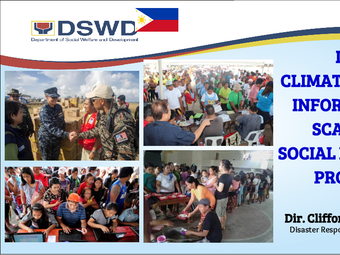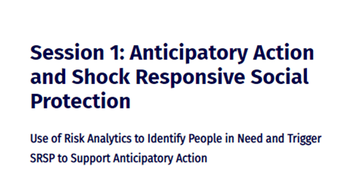Philippines Joint Simulation on Cash Early Actions & Shock-Responsive Social Protection for Flood
This blog post shares lessons from the implementation of the 2-day Forecast-based Financing (FbF) simulation exercise (simex) on 18-20 May, to test two early actions - fish harvesting from ponds and cash transfers - in three barangays (villages), Libmanan municipality, Camarines Sur. The German Red Cross (GRC) and the Philippines Red Cross (PRC) implemented the simex together with the Food and Agriculture Organization of the United Nations (FAO), with observers from START Network, WFP, and OCHA. Specifically:
- Fishpond harvesting: supported by community cash-for-work (CfW), the provision of fishnets, bamboo poles, and other materials.
- Cash transfers: assessed the feasibility of working with Department of Social Welfare & Development (DSWD) and national social protection (SP) systems to deliver cash, and to target and pre-register beneficiaries using the national poverty and other databases
- Coordination procedures for the simultaneous intervention of multiple actors in the same geographical area were an important part of the simex given the growing interest in Anticipatory Action (AA).
So, how did it go?
We interviewed Simex leads, GRC FbF Project Delegate Damien Riquet and FAO Social Protection Specialist Ruth Honculada-Georget to find out more. Read the interview below:

Why did you decide on a joint simulation with partners?
Damien
"The collaboration between FAO and PRC-GRC on FbF began in 2018 planning for drought Anticipatory Action (AA), also in preparation for the Asia Dialogue Platforms in 2019 (in Manila) and 2020, and continues together with other stakeholders via anticipatory action (AA) for typhoon planning, so we know that collaboration benefits us all - for instance, Ruth is a social protection (SP) expert, so she helped us to understand SP and to link it to FbF. Until recently, coordination has not been an issue, as there were very few actors working on AA, yet it will be crucial in future so we decided it's important to share our knowledge and experience, and to build up coordination structures now, as the momentum for anticipation grows."
Ruth
"Fortunately, the Philippines has a robust social protection system that can be used to scale up cash transfers as an anticipatory action to severe hazards like floods, by using existing targeting and delivery systems. Largely known as shock responsive social protection (SRSP), in coordination with the Department of Social Welfare & Development (DSWD), the simex tested the use of the Listahanan (4Ps and non-4P households) to scale up a response within the limited timeframe of 72 hours. Many of these agriculture and fishing households live in high risk areas, have little or no savings, and have less chances of recovering from disaster impacts. The aim was to put our theory into practice, observe the process, and document opportunities and limitations. The GRC/PRC was very open to trying this nascent approach and provided the opportunity for our government counterparts to be part of this process."
Building on the existing social protection systems' data
The Pantawid Pamilyang Pilipino Program (4Ps), is the national poverty reduction strategy of the government implemented by the DSWD. The 4Ps provides rice and conditional cash grants to eligible poor and near poor individuals and families; recipients are likely to need a cash “top-up” to cope with predicted flood impacts. The National Household Targeting System for Poverty Reduction, locally known as the “Listahanan”, is a poverty database, where “near poor” could be identified, those likely to become poor if flood-affected, as well as the “new poor” whose data could be in the Listahanan.
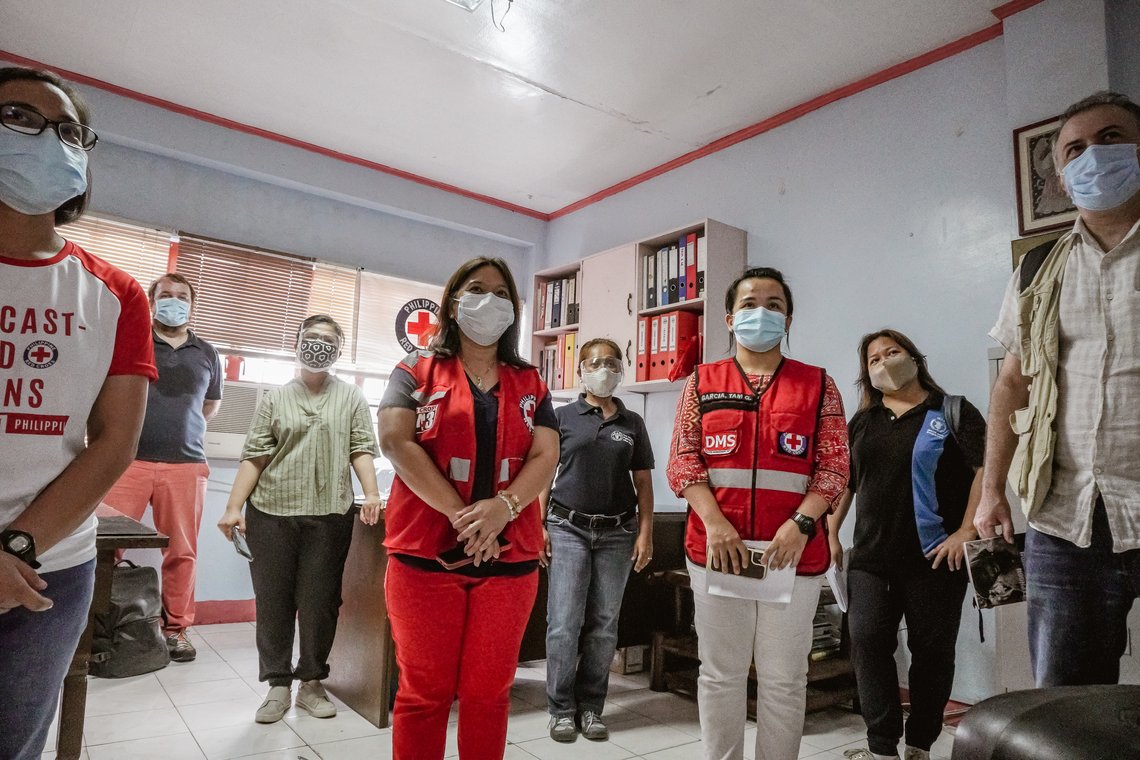
Damien, can anyone work with the PRC-established Ccoordination Committees?
Damien
"I´m happy you asked me this because I feel quite strongly about it. The PRC have worked hard to establish these coordination mechanisms, collaborating intensively with the government and community to explain, advocate for, and importantly, to pilot and implement anticipatory action.
An FbF Core Group has been established at the provincial level who collaboratively select the Early Actions, with all the details agreed by key actors involved to ensure smooth implementation. The Core Group in each targeted province provides the necessary technical guidance to the PRC chapters in the development and implementation of the Early Action Protocol (EAP), including on the preselection of areas the most at-risk.
I strongly recommend that newcomers to this anticipation space make efforts to utilise the existing structures. Trust me, it is a lot easier to work with people who understand and have experienced Anticipation! We are happy to share our methods, so please just reach out to us and ask! See also the Forecast-based Financing Manual for general support.
The figure below, outlines the steps of how we coordinate at Barangay / Local Government Unit-level (LGU). You can also meet some of the key stakeholders in our last FbF Newsmagazine."
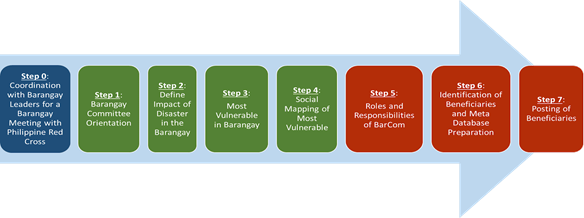
Why did you test cash-based Shock Responsive Social Protection for FbF? How did you manage the data sharing agreements?
Damien
"Both early actions (typhoon and flood) have a 3-day lead time therefore it is of tremendous benefit to have pre-registration methods, pre-lists prepared and agreed by the government and community. Money gives people choice and electronic cash transfers have the potential to reach thousands more people in a shorter timeframe. For this simex there was an MoU between the DSWD provincial office to share beneficiary data with the PRC. The process was lengthy, but not difficult to access preliminary data. Currently, only the 2015 Listahanan 2 database is available and needs to be updated. Listahanan 3 data is currently undergoing validation."
Ruth
"We needed a data sharing agreement with the DSWD to access poverty registries and to ensure protection of personal information and only used as intended. FAO works closely with DSWD at the national level to have access to the Listahanan, the Department of Agriculture’s (DA) own Registry for Basic Sectors in Agriculture (RSBSA) for the list of small-holder farmers, and the Bureau of Fisheries and Aquatic Resources’ (BFAR) for fisherfolk beneficiaries. Ideal would be to have one registry connecting all these data sources. The government recently introduced PhilSys, a national ID system, so hopefully this will improve targeting."
Do social assistance beneficiaries overlap with those likely to be impacted by floods? How was this validated?
Ruth
"Yes, there is an overlap, because the focus is not just on poor, but also vulnerable families, and consensus is that these people are usually disproportionately affected by hazards, which makes a compelling case for why social assistance beneficiaries such as those enrolled in the 4Ps programme should be a priority. By providing interventions before a disaster, we can protect these peoples´ health and education development gains.
From the 3 Libmanan barangays historically prone to flooding that were selected for the simex, the aim to understand how many potential vulnerable households would be in these communities, overlay the data with the existing 4Ps recipients pre-registered list, and to gather additional non-4Ps households from the Listahanan. We knew that the household status may have changed and did not rely on those static lists. PRC volunteers looked at the existing registries from the Department of Agriculture’s (DA) own Registry for Basic Sectors in Agriculture (RSBSA), so the process of pre-registration was to put together using different registries to identify who would be the most affected if there was a typhoon-induced flood.
The validation process was led by the Barangay Committee (BarCom) composed of local leaders, established by PRC, usually used in PRC response programmes, and adapted for anticipatory action. The simex demonstrated the importance of community-based validation processes to ensure transparency and to avoid miscommunication on the selection process. This process could potentially complement a national scalability framework response for floods which the government is currently working on."
Damien
"The final selection of the 200 beneficiaries in the two flood prone barangays targeted for the anticipatory cash compromised of:
- 23% from 4Ps (recipients of government social assistance)
- 35% from Listahanan 2 (not receiving 4Ps benefits)
- 39% were newly added with the support of Barangay committee. Some households were impacted by COVID therefore recently fell below the poverty line. This target group was the most complicated one and quite big at around 39% of those to receive “simulated anticipatory cash”.
We expected that the Listahanan & 4Ps lists were not updated, people had moved to a different LGUs, however it was a good basis to add more, especially because previously we excluded 4P beneficiaries and created new beneficiaries lists from scratch."
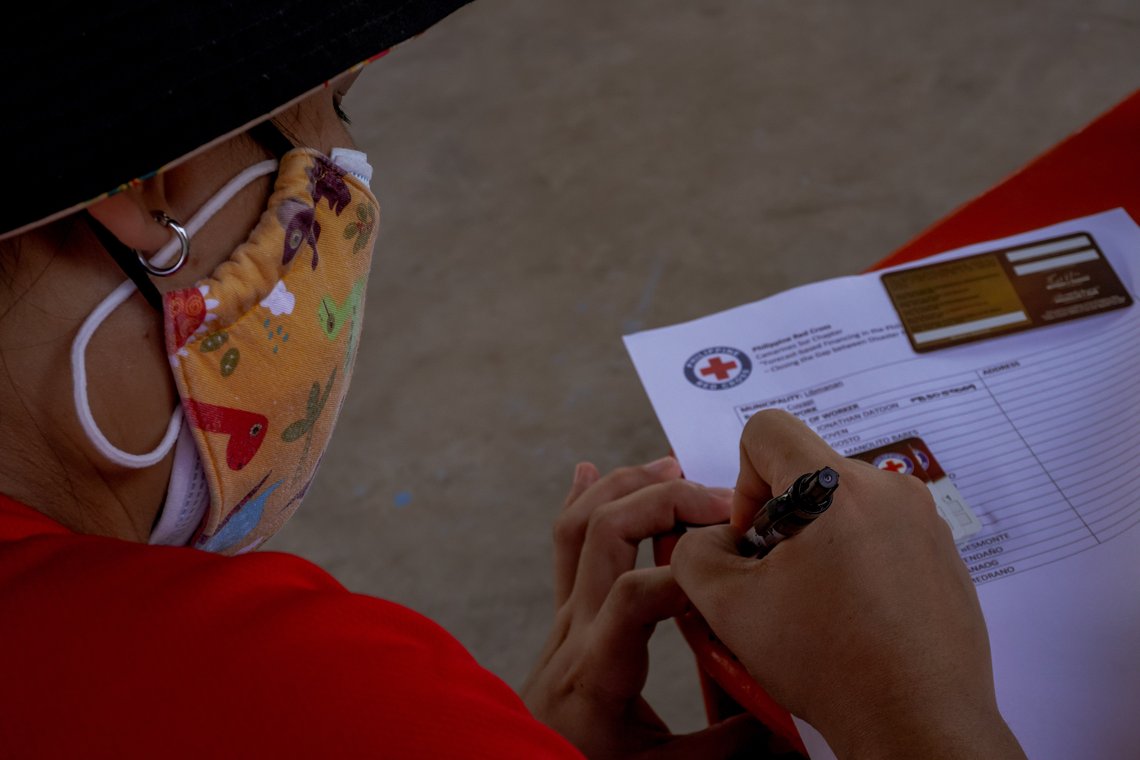
Why Financial Service Providers (FSP) Phil Post and Palawan Express to transfer cash?
Ruth
"The LandBank of the Philippines is the DSWD existing cash delivery system for poor households enrolled in the 4Ps programme, whereby beneficiaries access conditional cash grants through ATMs using cash cards (partner FSPs are also used). This would be an ideal system to release anticipatory cash. However, it wasn’t´ tested given the small number of households targeted for the simex as the process requires a somewhat lengthy tripartite agreement. Using a SRSP approach in future, humanitarian organizations should be able to include potentially affected populations, as a subset of the 4.6 million 4Ps households already enrolled. Getting the agreements in place is a long but necessary process requiring advanced preparation if humanitarians plan to use existing government systems. In the simex, cash transfers via Phil Post and Palawan generally went well thanks to the PRC volunteers, but to release cash in future, FSPs would need to provide more logistics support i.e. increase manpower, simplify processes, and practice stricter social-distancing protocols, due to the projected increase in caseload on top of their regular cash disbursements."
How can Anticipation in the Philippines grow, reach more areas and more people?
Damien
"Electronic cash can help, especially for rapid onset events, so ideal as an early action because cash has the potential to reach thousands of people quickly. Additionally, involving government partners in our interventions can help scale up anticipatory actions in the Philippines: today, 4 provincial LGUs are already allocating preparedness funding for replicating PRC anticipatory actions (Western Samar, Southern Leyte, Agusan del Norte and Davao de Oro).."
Ruth
"Humanitarian actors are in a good position to demonstrate how anticipatory action is done and why a paradigm shift from ex-ante to ex-post can make a difference in the lives of poor and vulnerable families, especially those farming and fishing households, who bear the brunt of a natural hazard. Yet how can we scale-up and reach more families within days to mitigate the damage, and protect lives and livelihoods? This will require political will, consensus building at all levels, technical advice and coordinated effort with the government to ensure a harmonized approach. Most importantly, how is this going to be financed? The DSWD recently released its Guidelines for Emergency Cash Transfer During Disasters (ECT) but we still need to explore if it can also look at anticipatory action and make its systems shock responsive. This is only one proposed action and is not the “silver bullet”, yet we know that multiple disasters, like floods, tropical cyclones, will happen in the country, and therefore the simex dares all of us to reflect, re-think, and re-strategize, the way we do things to reach poor and affected populations faster."
How would you summarise the key lessons learned?
There is no single FSP with whom we can work on a national level to go to scale and provide fast cash transfers. Currently, both the government and private FSPs are only appropriate for small-scale cash transfers, and solutions remain location specific. The private sector is part of the solution so we must also further explore that with the banks and telecoms providers to see how they can extend outreach.
Data sharing agreements are crucial. We need a data sharing MoU with the DSWD provincial office to access the more updated Listahanan 3 as soon as it is available. The process takes time so this is a critical part of preparedness.
National poverty registry and other databases can be used as a good first step for pre-listing individuals and households vulnerable to flood impacts. There is consensus that current social assistance beneficiaries´ vulnerable status means they will require a top-up in the event of a shock, however the fluidity of households, frequent exposure to shocks, and lack of means to self-update information electronically, requires CBT with LGUs to validate lists. This takes time so it is crucial that pre-listing, pre-registration, is prepared for in advance.
Coordination would benefit from the DSWDs presence at LGU-level to understand the challenges. We know the DSWD is keen to explore anticipatory action, and to be integrated into simulations and pilots, so efforts should be made to plan with them. There are opportunities for intra-government learning too as some LGUs begin to use their own funds to implement EA based on what the PRC has done.
To wrap up - What's next for anticipation and SRSP in the Philippines?
Ruth
"The Philippine government has recently endorsed the country’s Roadmap to establish an adaptive and shock-responsive social protection (ASRSP) system. The Roadmap is anchored on key policy strategies from the Social Protection Framework and Plan as well as the National Disaster Risk Reduction and Management Plan (NDRRMP). FAO shall continue to provide technical assistance to operationalize this Roadmap at the national level. In parallel, local efforts and pilot activations need to continue at the local level to build evidence and demonstrate proof of concept. The FAO and the UN system in the Philippines, through the Central Emergency Response Fund managed by OCHA, is preparing to demonstrate anticipatory action activation in the event of a severe tropical cyclone in the coming months. This I think is an important parallel approach while waiting for the national system to evolve. This is where the strong partnership and coordination with GRC/PRC is imperative because of its leadership and experience in the field of FbF. We look forward to working with the dedicated GRC/PRC team, chapters and volunteers on the ground who were instrumental to making the simex a worthwhile endeavour."
Damien
"As Ruth mentioned, OCHA develops a typhoon anticipatory action framework, focusing regions V (Bicol) and VIII (East Visayas), based on our Netherlands Red Cross 510 trigger methods and thresholds, together with a Core Group of 5 UN agencies, GRC/PRC, and START. It is exciting to see more stakeholders bilaterally plan their anticipatory actions with the LGUs. The simex learnings can guide us all and contribute to better field level coordination; we plan to propose to all partners working on anticipatory action to review the target LGUs with the FbF Core Groups established at province level, starting with Catanduanes Island at the end of June. Lastly, together with FAO, we currently write up this simulation Case Study, so watch this space for more details!"
Impressions of the simulation
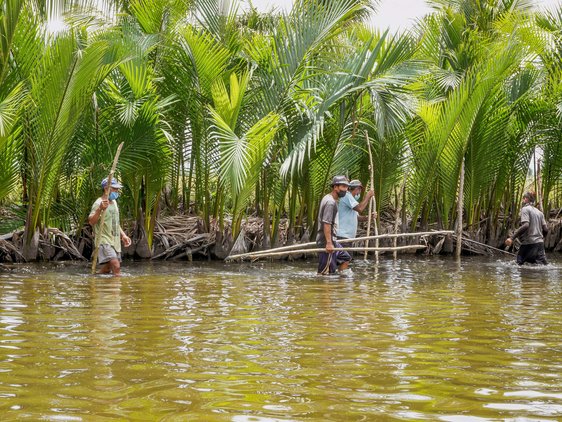
© GRC
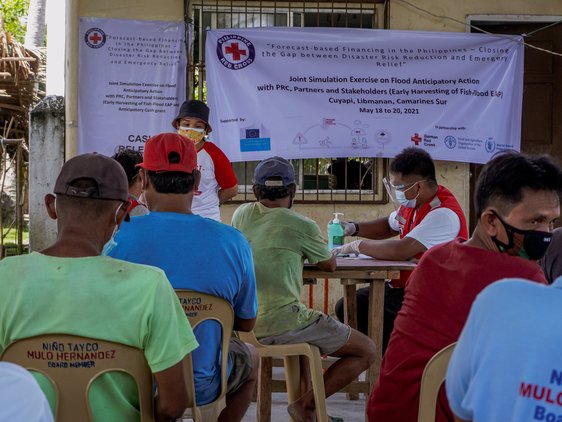
© GRC
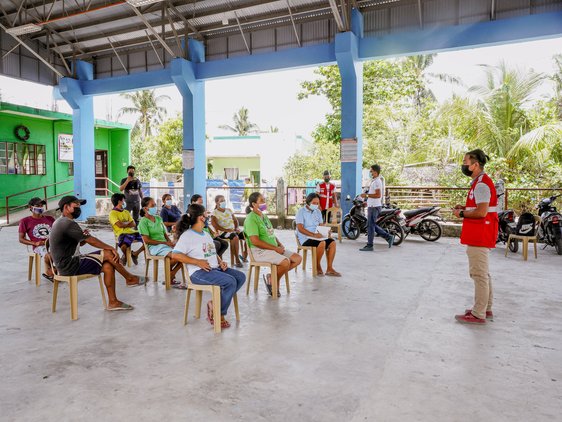
© GRC
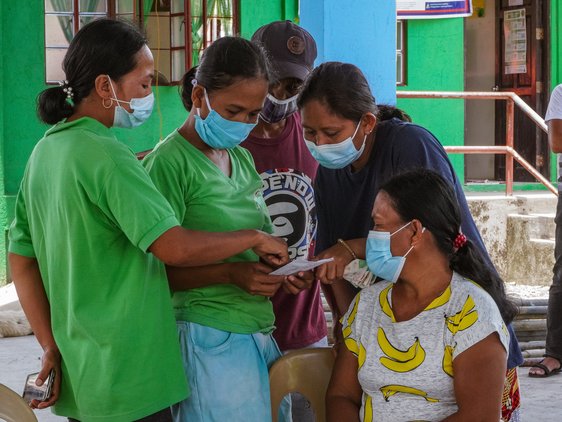
© GRC
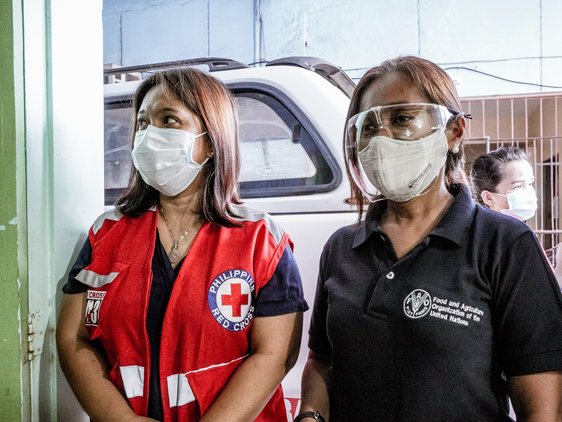
© GRC
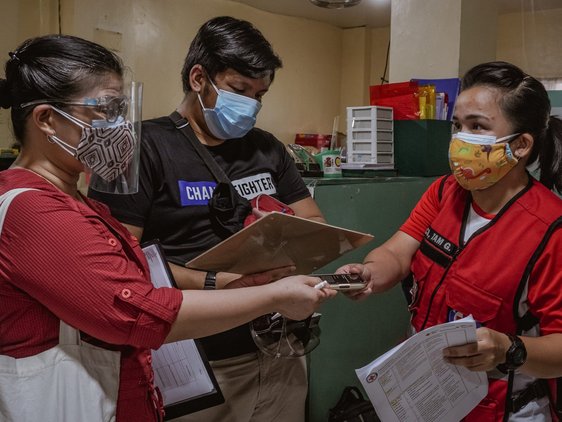
© GRC
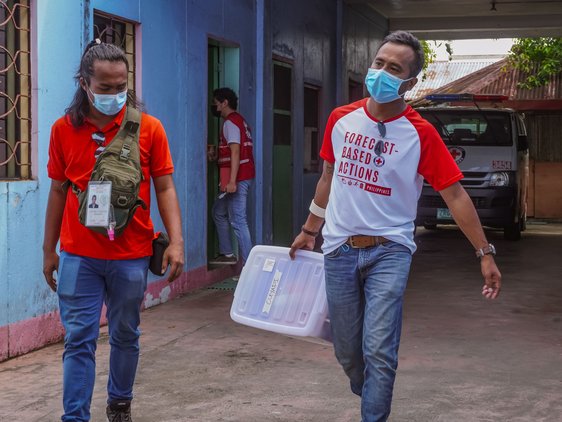
© GRC
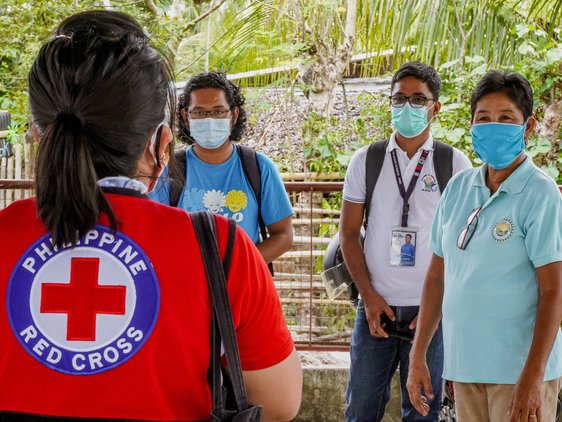
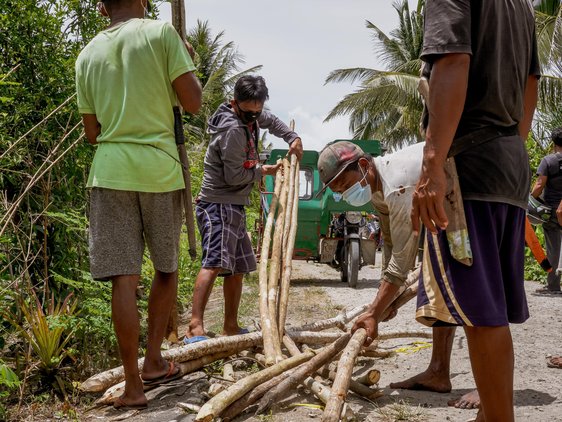
© GRC
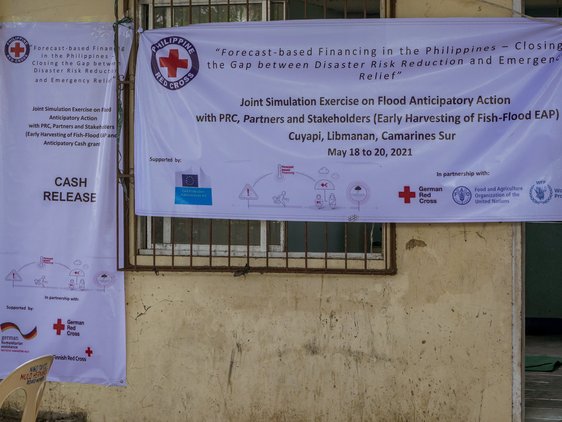
© GRC

© GRC
© GRC
© GRC
© GRC
© GRC
© GRC
© GRC
© GRC
© GRC
This blog was written by Anita Auerbach, Cash-based Early Action & Social Protection, German Red Cross Society; please get in touch with me via mail to A.Auerbach(at)drk.de if you would like to share your experiences on cash-based early actions or SRSP on the Anticipation Hub, and with Philippines anticipatory action related questions with elena.suero(at)germanredcross.de or ruth.georget(at)fao.org.

